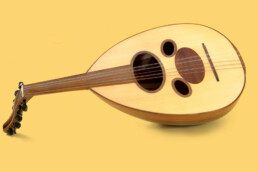Yes, certainly.
I strongly believe it is perfectly permissible to do so.
Al-Bukhārī relates that A’ishah b. Abī Bakr, the wife of the Prophet, would have her servant Dhakwān lead her in prayer from the mushaf. There also doesn’t seem to be any explicit prohibition from doing so.
This is the position (permissibility) of Abū Hanīfah’s students: Muhammad al-Shaibānī and Abū Yūsuf, although Abū Hanīfah himself considered it impermissible. The two students held it to be disliked in the context of imitating the Christians as reported by al-Haskafī and al-Kāsāni, but since that’s not a consideration in our context, on their view there is no aversion (karāhah).
The position of Mālik was that it is permissible in nawāfil (optional) prayers such as tarāwīh/qiyām. In the Mudawwana it is recorded that he said, “There is no issue with the imam leading the people from the mushaf in prayer during Ramadan, and in the nāfilah (optional prayers).”
al-Shāfi’ī considered it permissible, with al-Nawawi in his al-Mujmū’ going as far as to state, “In fact it is obligatory on him to do so if he has not memorised al-Fātihah. If he turns the pages occasionally his salāh is not invalidated. If he looks at a text that is other than the Quran and repeats it to himself his salāh is not invalidated even if he does so for extended periods of time, although it is disliked. al-Shāfi’ī was explicit about this in his al-Imlā.”
Ibn Qudāmah relates in al-Mughni that Ahmad b. Hanbal said: “There is no issue with him praying qiyām with the people reading from the mushaf.”
al-Zuhrī was asked about a person who reads from the mushaf during the Ramadan night prayer. He replied, “The best amongst us read from the mushaf.”
The majority of the early Imams held it to be permissible without aversion (karāhah).
Now for those who consider holding a mushaf whilst performing tarāwīh/qiyām to be impermissible, there seems to be three main contentions which I very briefly deal with here:
1. that reading from a mushaf will prompt unacceptable amounts of unnecessary movement in prayer, and consequently, invalidate it.
This argument doesn’t seem to be very strong since the amount of movement required from holding a mushaf isn’t much. Ultimately, what we consider a lot or a little will boil down to social norms (‘urf/ādah). However, if we must seek a precedent, then we ought to refer to the Prophet’s own actions to determine the benchmark of how much movement is, or is not, problematic. For example, the Prophet held his granddaughter Umāmah b. Zainab standing in prayer, and when he prostrated, he would put her down (al-Bukhārī and Muslim). Obviously, carrying a child requires far more movement and cognitive attention than a mushaf. There are additional examples of prophetic movement in prayer that help to shape the parameters:
- The Prophet was directed by the angel Gabriel to remove his shoes during prayer (Abū Dāwūd),
- The Prophet softly took Ibn Abbas by his head and moved him to the right side of himself (al-Bukhārī and Muslim),
- The Prophet would physically beckon a sleeping A’ishah to move her feet out of the way when he would go into prostration,
- The Prophet directed women praying in congregation to clap if the imam needed to be alerted to a mistake (al-Bukhārī and Muslim),
- The Prophet opened the door for A’ishah whilst in prayer (Abū Dāwūd)
All of these examples (and there are more) also prove that such movements do not infringe on the basic amount of khushū’ (reverential tranquillity) essential for salah.
2. that reading from a mushaf amounts to taking inspiration (talaqqi) from elsewhere.
Whilst this is somewhat true, it does not mean that doing so invalidates the prayer, or that it is disliked, and certainly not according to A’ishah who had Dhakwān lead her in prayer from the mushaf. Furthermore, if the imam makes a mistake in his recitation, then the congregation are to speak up and correct his mistake, thus inspiring him with the correct wording. It might be argued that such a correction tends to amount to a few words, not the entire verse, yet we frequently see imams in tarāwīh having to be reminded of entire short verses. Besides that, the distinction between a few words and a short verse seems quite arbitrary.
3. that the Prophet never encouraged the sahabah to read from a mushaf, but told them to praise God if they struggled to memorise passages of the Quran.
We are at liberty to ask: was this because doing so is wrong, or because written copies were in extremely short supply, most people were illiterate? The report about A’ishah and Dhakwān as well as a whole host of other variables seems to suggest that the latter was the case, and not because holding a mushaf would invalidate salah.
In fact, if we look at the bigger picture of subservience to God, and standing before God, it’s hard to see why God might be offended at His servants holding scriptures and reciting them out aloud at night. And as the Prophetic example demonstrates, simply holding something (in his case, Umāmah b. Zainab) doesn’t offend God.
[As an usulī side point: I don’t believe that we need to use the argument of a concessions for holding a mushaf during tarawih. There’s no need to appeal to shar’ī concessions, it is a normative practice – social isolation or not, Ramadan or not.]
God alone knows all things, and I defer complete knowledge to the Most High.
Related Posts
1 Comment
Add comment Cancel reply
This site uses Akismet to reduce spam. Learn how your comment data is processed.





Salaam Shaykh what about holding a mushaf that has English translation, and reading that along behind the imam.